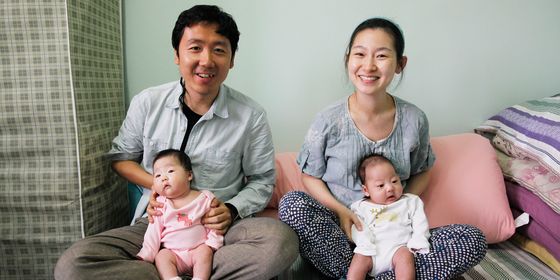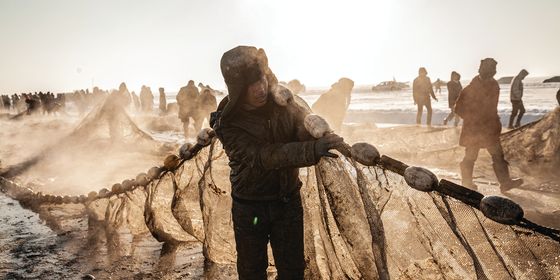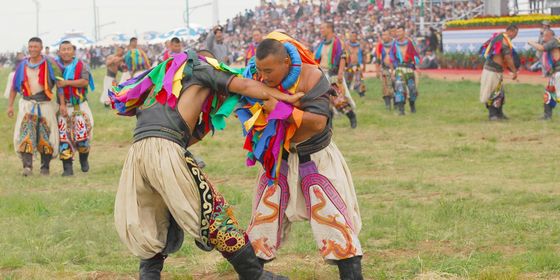Some Chinese wedding games may turn the blessing happy occasion into a curse
Weddings are supposed to be the happiest day of one’s life, but there are increasing reports of dedicedly unhappy incidents occurring at weddings in China, especially around the peak time for nuptials—holidays. Over the National Day holiday, a video spread on the internet showing a groom in Guangzhou being tied to a tree and treated to a fireworks display on his ass. He ended up in hospital, with multiple injuries to his posterior—hardly the best start to any marriage.
Some have predictably argued that the best man’s hilarious prank was simply part of a long Chinese nuptial tradition, hunnao (婚闹, lit. wedding turbulence) or naohun (闹婚, lit. creating wedding turbulence). This tradition can date back to Han Dynasty (202 BC-220 AD) and originally refers to nao dongfang (闹洞房, lit. teasing the new couple in the wedding chamber), where guests make fun of the bride and groom with various games on their wedding night.
According to folk belief, the ritual was created to expel evil spirits, or to prove the groom a worthy husband by withstanding the “beating test” for nomadic people in northern China.
Practically, the practice is supposed to help the new couple get familiar with each other quickly and cooperate to solve problems, as in ancient China, most couples would have been strangers who met once, a few times or perhaps even never before their wedding. Some games worked as sex education since Chinese married young around—15 years old. In addition, hunnao entertain guests and “add joys” to the blessed occasion.
In modern China, though, most people find their own love and there is no longer any need for such games to familiarize new couples. But common weddings seem no longer sufficient to engage guests in the celebrations, and games continue as a way to tease the new couple, bridesmaids, groomsmen and even parents of the groom, with some going far, far away from so-called tradition into the definition of harassment and abuse.
Bullying the bridesmaids
In recent years, bridesmaids have gradually taken brides’ place to be the main target on wedding days. They are expected not only to receive guests and wedding hongbao, drink and do other errands on the bride’s behalf, but also to handle all kinds of teasing, flirting or even sexual harassment that constitutes “bridesmaid bullying” according to the Global Times.
A recent case in Xi’an this July went showed two grinning groomsmen pawing a bridesmaid’s breast and trying to remove her underwear. In a similar case from 2006, a distraught bridesmaid named Li filed a police report after being stripped naked, and regaining consciousness to find tortoises drawn all over her body.Today, more and more females are refusing to engage in the practice, and some new couples now have to hire professional bridesmaids.
Teasing the groom
The groom is usually subject to at least one or two rituals before he can get on with his day—the most common being the Q&A session to “prove” his love for the bride: The bridesmaids usually ask a number of private questions concerning their relationship, and the groom is expected to answer or cough up some hongbao in order to be allowed to see his bride. If the groom does not prepare enough money or is unwilling to front that much, he can resort to…technology, such as a saw.
The groom must endure his own friends’ congratulations. They may dress him in a red bra or strip him to his underwear, or bind him on a tree and sprinkle beer and soy sauce on him, or pelt him with fresh eggs. Or he may be tied on a tree with the indispensable firecracks setting off below. If the wedding is to be held near the sea or a swimming pool, there are extra risks of the groom being thrown into water, even in freezing winter. It’s not easy for men to get finally married. Sadly, professional grooms are not available yet.
Pranking parents
In a few cases, the groom’s parents, who are traditionally respected and might even expect to be served tea by the new couple, become part of the amusements. They may be dressed up with extra accessories and signs, usually indicating a strong relationship between the groom’s father and the bride. Or the parents may be required to act as horses to pull the wedding car, which may signify they will remain at the service of the new couple.
Gaming the groomsmen
In most cases, it’s the groomsmen who make trouble for the new couple, bridesmaids and the groom’s parents. More recently, the tables have been turned, as men are believed to be more tolerant to rough jokes. This month, a groomsman in Shandong province was reported to have suffered a cerebral concussion in a sudden fall after being picked up and swung around by some guests.
Now, one may be curious who on earth benefits from these so-called traditional or “innovative” wedding games. No one really knows: The practice just continues and news about wedding fiascos occur each year. Any relative may be at risk if there are local traditions that insist on a prank.
To play it safe, families of new couples may choose to marry elsewhere or not attend a wedding at all, following in the footsteps of recalcitrant bridesmaids and groomsmen.












